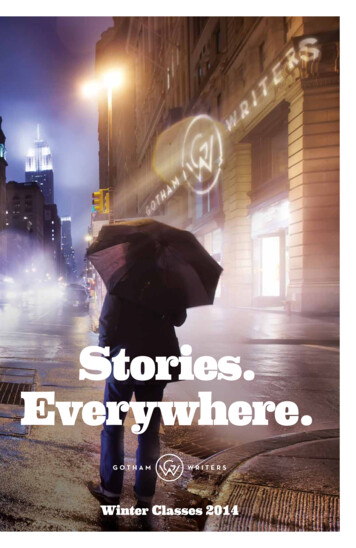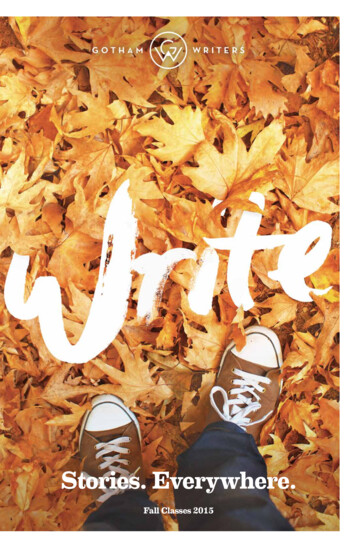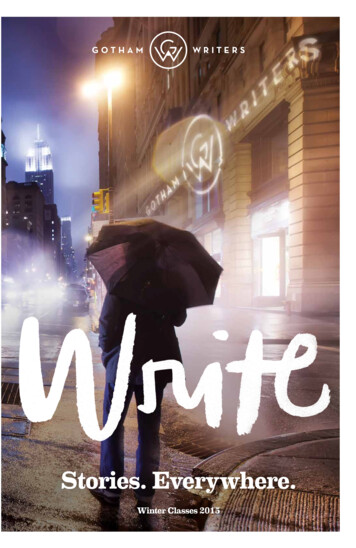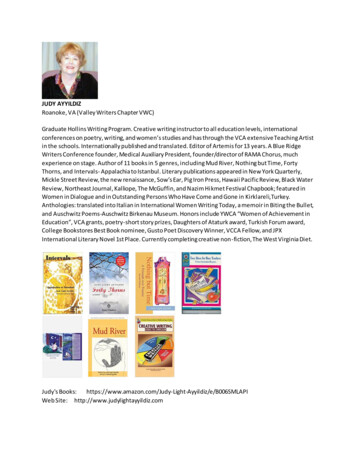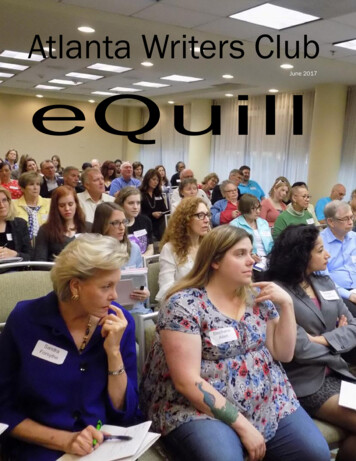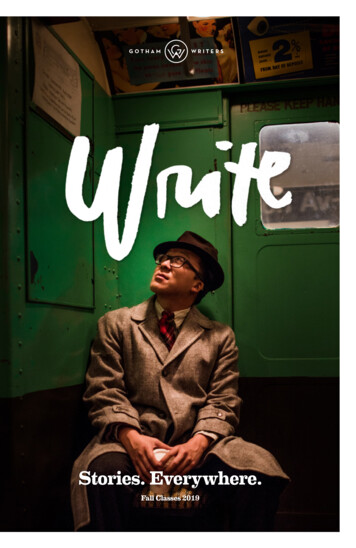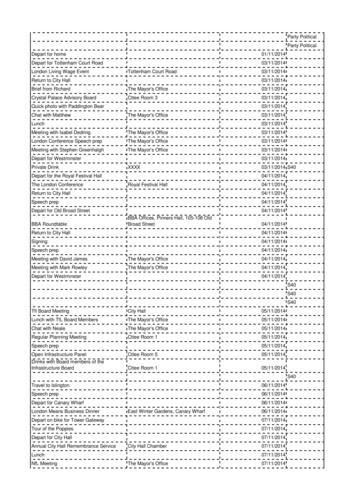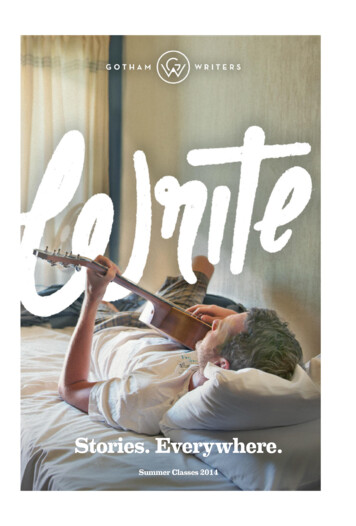
Transcription
Stories. Everywhere.Summer Classes 2014
Photo: Derek MidgleyG OT H A M WRI T E RS .COMtwitter @GOT HAM W RI T ERS
OUR STORY HAS BEEN T WENT Y YEARS IN THE MAKING.Gotham Writers Workshop is a creative home in New YorkCity and online where writers develop their craft and cometogether in the spirit of discovery and fellowship. We’ve beenteaching creative writing to tens of thousands of studentssince 1993.We believe that everyone has a story to tell. Whether you’rea new writer looking for a safe space to spread your wings oran experienced one looking to deepen your skills and receivefeedback on your work, our classes help you reach your goalsin a structured and fun environment.We are also invested in helping students find the writing classthat is most appropriate for their particular needs. Explore ourwebsite, and feel free to discuss options via email or phone.Thousands of people have been enriched by the Gothamexperience. It’s why we’ve been around twenty years.We strive to give each student the best possible learningexperience. Class size is strictly limited so students neverget lost in a crowd. And our instructors are consistentlyexcellent—working writers who are as skilled at teachingas they are at writing.CONTACT@G OTH A MWRI TE RS .CO M212–974– 8 37 7
CoursesFictionNonfictionScriptwritingComedy, Poetry & SongWith only words and the reader’simagination, a work of fiction cansail across the world in pursuitof a whale or zero in on a fewminutes in line at the local bank,luring the reader into a story thatfeels real.Whether it’s an experience foundin your kitchen or halfway aroundthe world, whether it’s an ideayou can’t forget or a conversationwith a fascinating person,sometimes the most intriguingstories are true.We all like to be entertained,whether it’s watching a performance live on stage or flickeringon a screen. Here’s where youlearn to write the material thatholds those audiences in thrall.Send words soaring in thelyricism of poetry or song.Or get people high on laughterthrough stand-up comedy orhumorous ONFICTION 101TV WRITINGHUMOR WRITINGCHILDREN’S BOOKSMEMOIRPLAYWRITINGSTAND-UP COMEDYSCIENCE FICTION & FANTASYESSAY & OPINIONDOCUMENTARY FILMSMYSTERYPERSONAL ESSAYSCRIPT ANALYSISROMANCEARTICLEREADING FICTIONTRAVEL WRITINGFOOD WRITINGEssentialsProfessional DevelopmentClasses for TeensOne-on-OneCreative Writing 101 is an idealstarting point for writers, to testthe waters or wash off the rust.The other courses here focuson crucial aspects of thewriting craft, useful for alltypes of writing.If you want to be taken seriously,these courses sharpen your skillsin the workplace, or help youbuild a platform as a writer, orguide you through the tricky taskof publishing your work.Pressure-free, creativity-stretching,not-like-school courses forwriters ages 13-17. Useful forexpanding your talent orgaining skills bound to helpwith essays and schoolwork.It’s wonderful to learn in a groupsetting, but sometimes one-on-oneis the right match. You may wanta private class, or “doctoring” on aspecific project, or a professionalmentor to guide you, or one of ourspecialty arrangements.BUSINESS WRITINGUNBOUND: CREATIVE WRITINGCREATIVE WRITING 101HOW TO BLOGTRUE STORY: CREATIVE NONFICTIONCHARACTER DEVELOPMENTHOW TO GET PUBLISHEDSCRIPT DOCTORINGDIALOGUE WRITINGNONFICTION BOOK PROPOSALMENTORSHIPSWRITE IT RIGHT! (Grammar)HIT SEND: PUBLISHING SHORT NONFICTIONPRIVATE SESSIONS AND CLASSESBOOK/STORY DOCTORINGTHE WRITER’S MINDCOLLEGE ESSAY COACHINGTHE EDITOR'S EYEMFA APPLICATION ASSISTANCEIN (VERSE): POETIC TECHNIQUESBLOG LAUNCHFOR NON-POETSPROMPT-A-THONEvents and Free ClassesGotham offers various events that bring writers together, such asour weekly Write-Ins. And we present free classes aroundManhattan and Brooklyn to showcase our teaching.Check our website for listings.G OT H A M WRI T E RS .COMtwitter @GOT HAM W RI T ERS
Ways to LearnIn-person classes are in NYC,with locations inManhattan and Brooklyn.Online classes draw togetherwriters from across the globe.ONLINE CLASSES BEGIN THROUGH JUN–SEPTNYC CLASSES BEGIN JULY 710-Week Workshops6 -Week ClassesSelling SeminarsIntensivesThese classes use a combinationof lectures, exercises, and workshopping (critiquing of studentprojects). In New York City, theymeet for three hours per week;online, each session begins atthe same time each week, andunfolds gradually all week long.Available in Level I, Level II,and, periodically, Level III.These classes let students explorea variety of forms and concepts ina low-pressure manner, througha combination of lectures andexercises. In NYC they meet forthree hours per week (two hoursfor Business Writing); online, eachsession begins at the same timeeach week, and unfolds graduallyall week long. (Timing and price isdifferent for Business Writing.)These courses emphasize thebusiness side of writing. TheNew York City versions takeplace over two three-hoursessions. The online versionstake place over four weeks.In NYC, these are seven-hourcrash courses, taking place allin one day. The online versionstake place over three weeks. 420 — NYC 399 — Online 125 159 299Registration fee for these classes: 25 paid once per term.CONTACT@G OTH A MWRI TE RS .CO M212–974– 837 7
Illustration: James Anzalone
Gotham FacultyNEVER TOO LATEFaculty InsightBY RICHARD G O ODMANI didn’t write my first bookuntil I was forty-six years old.It wasn’t that I didn’t want to.It was just that, for whateverreasons, I didn’t. This is howit happened.For many years I worked inadvertising. When peopleasked me what I did fora living, I’d say, “I’m in advertising—but I really want towrite.” I never could musterthe moxie to say, “I’m a writer.” How could I? I’d neverpublished a book. I’d neverpublished much of anything,actually. Even my unpublishedoutput was relatively slight.“He’s never written a book.He never will.”“He’s never gottenmarried, either.”“I know. Are you thinkingwhat I’m thinking?”“I have been for years."I may have walked aroundthinking and believing I wasa writer, but where was theproof? I’m sure enough people already thought I was afraud. If they didn’t, I beganto. I’d been talking about being a writer to a select circle offriends and relatives for yearsand years.After a decade or two, I imagined them like in one of thosescenes in a Grade B moviewhere people gather in a circle, eyes darting toward theperson in question, whispering about him, their lips moving in barely-disguised disdain.“Oh, is he still saying he’sa writer?”“After all these years. It’sa shame.”“It’s a disgrace!”“He’s really just an advertisingcopywriter. Why doesn’t headmit it?”As I say, I don’t know whyI didn’t, or couldn’t, write abook. I still don’t. I took writing courses. I was in a writing group. I read inspirationalbooks on how to unleash theinner scribe in you. I drankbooze. I went to a shrink. Still,nothing came.But for some reason I stillharbored the idea, the belief,the faith, that I was a writer.I think it was because it wasthe only thing I could ever picture myself doing. It was theonly thing that made senseto me. It was the only thing Icould see devoting an entirelife to. Books and art in general seemed to me somethingworth living for. Somethingto choose for the one chanceyou have at life. Inside me,I knew this, and I trusted thatknowledge about myself, despite everything to the contrary on the outside.Yet, on and on I went withmy advertising career.Advertising! What an idealprofession for self-loathing,if you think you’re an artist.The Hucksters! The HiddenPersuaders! (Well, that attitude may have changed a bitwith the TV show Mad Men,which romanticizes the hellout of advertising.) It’s reallya Darth Vader kind of thing—using the force for evil insteadof for good.“Luke, come to the Dark Side.Write for Jell-O.”“Never!”“Yes, Luke, you will writean ad for Jell-O. Because youare like me, Luke. You wantto sell!”The years went on. Maybe Ireally wasn’t a writer, I beganto doubt. Something insideme just wouldn’t accept that,though. I just couldn’t capitulate. Which is, I suppose, thepoint of this little essay. Nevercapitulate. Only you knowwhat is true about yourself.People can say whatever theywant about you and your aspirations, but it is you who knowyour own heart. Listen to it.Then I fell in love with agood, strong, caring, courageous woman. It was she whohelped me to write. She didn’tactually put my pen to paper,but she might as well have.We went, at her urging, to livein France for a year. There,I found inspiration, and thesubject, for my book. It was inthe unlikely form of a vegetable garden in Provence.Then I came home, I sat downat my desk and began to write.At the start, though, I hesitated: will my first, and perhaps my only, book be abouta garden? How could that be?Shouldn’t I be writing aboutthe equivalent of the hunt for agreat white whale? Shouldn’tmy theme be mighty, asMelville required? Here I am,about to write about a garden. But my heart told me thisis what I wanted, needed, towrite about. And my pen wasdying to be let go. So, I let itgo, wisely.I wrote, without ceasing, for ayear. All my love of language,of reading, of words, of drama,of character, all those pent-up,aching rivers burst forth andflowed through my little, sturdy Bic pen onto my page, dayafter day. It all gushed forth,and I worked like a dog totame the current and make itgraceful and pretty. It’s whatI had been living for, and thiswas the daily proof. It wastrue. I hadn’t been fooling myself all these years.Something else rather remarkable happened. I foundthat I could call on all the passionate reading I had donethrough the years. Sentences,phrases, words, metaphors,what have you, I had stored,like literary nuts, somewherefor safekeeping in the cacheof my heart, all were there forme to employ in my own book.Here came Hemingway whenI needed him, perhaps in aturn of phrase but more likelyin the effort to make the writing as clear and strong as adiamond. Here came ThomasHardy, with his humanisticsensuality, when I was tryingto convey the rapturous experience of watering my garden at night by the moonlight.And so on.When Frank first began working at the Times, hewas assigned to write an investment column for theBusiness section. “It’s quite difficult to write a compelling column about bond funds,” he says. “Youhave to learn a way into it.” But the good news? “Ifyou can write compellingly about stuff like that, thenit’s all the easier to write well about something youdo care about.”Faculty ProfileBY BRIT T GAM BI NOGotham teacher and journalist Frank Flaherty conducted his first interview with famed crosswordpuzzle editor Eugene Maleska. Frank was only inhis early twenties then, yet to begin his career at theNew York Times. “I didn’t really know what I wasdoing, but it was a lot of fun,” he says. “He lookedjust like you would imagine a crossword puzzle editor to look like: mismatched socks, tie thrown overone shoulder.” While the finished piece was neverG OT H A M WRI T E RS .COMBut what is luck? Isn’t it a certain persistent open-mindedness? It was pure hard-headedness, in the face of so manyarid years, that kept me going.I highly recommend it.Seventeen years later, thebook is still in print, still selling. I thank the gods for that.The fact is, some people writetheir first book when they’retwenty-three. Some people when they’re thirty-five.Some, like me, when they’reforty-six. And some, likeHarriet Doerr (the remarkableStones for Ibarra) when they’reseventy-three.I say, if you haven’t writtenyour book yet, there are norules when it comes to this.Your inspiration may come inthe form a lowly vegetable garden or a cookie dipped into acup of your aunt’s tea, or heaven knows what else. Just don’tever give up. I’m here as a witness to tell you that it’s never,never too late.This article first appearedin The Writer magazine.Richard Goodman is the author of French Dirt, The Soulof Creative Writing, A NewYork Memoir, and The BicycleDiaries.I was lucky after that year. Ifinished the book, and I foundan agent, and the book wasaccepted for publication, Frank maintains it was aworthwhile experience: “I just had fun doing it.”FRANK FLAHERTYpublished. I count my stubbornness, my blind faith, aspart of the reason I was lucky.Eventually, he worked his way up to Deputy Editorof the Metropolitan section, which covers newsaround New York City. Frank saw a lot of storiescross his desk over the years, but one piece he’s especially proud of is a feature about the psychiatricemergency room at Bellevue Hospital, written byErik Kinetz. “An ER without blood,” as Frank putsit. “All of the wounds are on the inside.” It was difficult to get the story done, as there were lawyers involved due to patient confidentiality issues. But allthe work paid off because, as Frank points out, “Itwas a good journalistic thing to do. It made peoplemore sensitive to the pain of mental illness.”“Journalists don’t make much money,” Frank says,“but you have a lot of great stories for cocktail parties.You get to have all these different lives.”During his tenure at the Times, the novelist andmemoirist Susan Shapiro invited Frank to her classto guest lecture on the process of editing. As he prepared for his presentation, Frank started thinkingabout all the editing issues he had encountered, buthad never written down. It was out of this material(and his subsequent teaching at NYU) that Frank’sbook The Elements of Story: Field Notes on NonfictionWriting was born. “It’s sort of a diary of how I edited,” Frank says. “It’s a ‘field guide,’ really, into thenewsroom.”Of the more common problems that writers face,Frank includes: 1) “The Conscientious Writer”—thewriter who always wants to keep everything in thestory. But, as he explains, “You have to choose something to focus on, otherwise you’ll focus on nothing”;2) “The Irresistible Anecdote”—the problem withthe anecdote is when it doesn’t have a place in thestory; 3) “The Fruit Salad Lede,”—when a writertries to jam all the important information in the firstgraph of an article; and 4) “Show versus tell”—toomany writers want to be direct and tell flat out whatis and what isn’t. “Showing gives the reader something to do,” he says.These are just a few pearls of wisdom you can learnfrom Frank in Gotham’s new course The Editor’sEye, which covers self-editing for both nonfictionand fiction students.Frank has since left the Times to concentrate morefully on writing. He’s in the midst of his second book,tentatively titled English: A Fan’s Notes. (It’s inspiredby a chapter in Elements of Story on the beauty oflanguage.) “Words,” Franks says, “are like my music. Some people look at paintings, I look at words.They’re my art.”twitter @GOT HAM W RI T ERS
Student Voices“The most fun three hours of my week,every week. In just a couple of months,I learned an incredible amount aboutthe craft of writing, and laughed heartilywhile doing it.”“Probably the smartest thing I have donewith my spare time in many years.”—Phil Fryberger, Financial consultant—Dodd Ellsworth, Software developer“A community of intelligent, supportivewriters with the best interest of thestory at heart.”“It’s no exaggeration to say that I owe mycareer in writing to Gotham.”—Josh Farrar, Writer—Erin Kidd, Indie publisher“This is the best course I have ever taken,and since I have a master’s degree, I havetaken hundreds of courses.”—Heather Stone, VP of marketing and sales“Try to imagine the Lord of the Rings trilogy without Gandalf. That’s what my lifewas like before I met my instructor.I would say three words to anyone considering a Gotham course: Do it now!”—Rois Beal, HousewifeCONTACT@G OTH A MWRI TE RS .CO M212–974– 837 7
WRITE-INSDo you wish there was a place you could go for writinginspiration and practice? Where you could hang out withother writers? Without needing to make a long-termcommitment or spend a lot of money?Gotham Write-Ins are that place.HERE’S WHAT HAPPENS: The teachergives an interesting writing prompt.Everyone writes for a while.Then, those who want to read aloudtheir work. You take a break andsocialize. Then you go throughthe process one more time. Thenyou partake of free drinks andsnacks and socialize a littlemore. It’s 90 minutes plus socialtime afterwards.There is no pressure, no critiquing,no angst. Just freewheeling creativity. It will get your juices flowingno matter what type of writingyou favor.RegistrationNYC ONLY 20 /per session 45 /3-session passIN MANHATTANFridays 6:30–8:30pmIN BROOKLYNSaturdays 12–2pmFurther details on our website.You can sign up in advance or youcan just drop in. It’s like an exerciseclass for writers. And it’s really fun!G OT H A M WRI T E RS .COM@GOT HAM W RI T ERS
CONTESTS: INVENT A WORDWe invite you to invent a word.Not just any word. A word youthink will greatly enhance theEnglish language.Interestingly, there are wordsthat mean “invented words”; thefancy word is neologism (inventedby Thomas Jefferson) and the informal word is sniglet (inventedby Rich Hall).THE WORD YOU INVENT MIGHT BE Adopted for the times. Such as selfieor emoticon.Sprung from politics. Such asmuckraker or Obamacare.Formed by merging two previouslyexisting words. Such as bootyliciousor blog.Related to the worlds of sciencefiction or fantasy. Cyberspace wasinvented by William Gibson for thenovel Neuromancer. Muggle wasinvented by J.K. Rowling for theHarry Potter books.Just a good sound. Such as chortleor persnickety.NOBODY INVENTED MORE WORDS THANSHAKESPEARE. TO NAME A FEW:articulate, bandit, bedazzled, besmirch, bump, clangor, corroborate,domineering, ensnare, eyeball, frugal,hobnob, incarnadine, intrenchant,lackluster, majestic, mimic, moonbeam, obscene, rant, suspicious, swagger, uncomfortable, vulnerable, zanyThough it’s an honorable practice,we discourage simple morphing(itself a fairly new word). For example, turning a noun into a verb, asin googling, or a noun into an adjective, as in flowery. Those probablywon’t wow us enough to win.SO, HERE’S THE DEAL: Give us theword, a one-sentence definition,and use the word in a sentence.For example Cyberspace – an alternate reality thatexists solely inside the digital worldof computers.Maurice cruised through cyberspacein search of the perfect answer.The inventor of the best wordgets a free Gotham class of hisor her choosing.Or just a word that we need. Suchas zonked or neologism.For competition rules and online entry form,— visit —GOTHAMWRITERS .COM/INVENT WORDCONTACT@G OTH A MWRI TE RS .CO M212–974– 837 7
REVISING OUR STORYGotham Writers Workshop is celebrating 20 yearsof helping writers discover their stories. Nowwe’re revising ours, with a new logo, a new look,and all kinds of new courses and initiatives.Stay tuned by visiting our website, getting on ourmailing list, or following us on social media.G OTH A MW RI TE RS .COM212–974– 83 7 7
Gotham Writers Workshop is a creative home in New York City and online where writers develop their craft and come together in the spirit of discovery and fellowship. We’ve been teaching creative writing to tens of thousands of students since 1993. We
